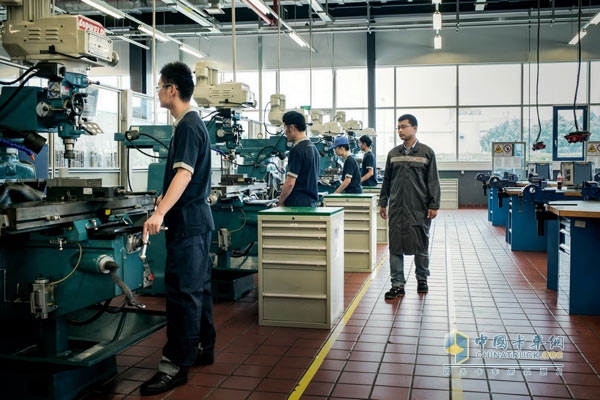The "Bosch apprenticeship program" was held at the Bosch Suzhou Apprentice Training Center before the fifth apprenticeship graduation ceremony in China. The project is based on the German "dual system" vocational education model and outline content. It aims to develop outstanding industrial and technical talents in areas such as machinery and electronics in response to business needs. Since the introduction of the Bosch apprenticeship program in China for the first time in 2007, the Suzhou Apprenticeship Training Center has trained nearly 300 outstanding industrial and technical workers. After three years of combination of theory and practice, students will pass relevant certification exams. At the same time of obtaining diplomas and academic qualifications, they can also receive the German Professional Skills Technician certificate issued by the German Chamber of Commerce and Industry. This certificate has been passed by more than 5,000 companies. Enterprise approval. The "dual system" vocational education of school-enterprise cooperation has a long history of development in Germany and is an important basis for Germany's manufacturing process leading the world. The "Bosch Apprenticeship Project" began in 1888 when founder Robert Bosch recruited the first apprentice. In order to pursue better training results, he only trains two apprentices in each period. In 1913, the "Bosch Industrial Vocational Training Center" was formally established. As of now, the Bosch apprenticeship program has trained 100,000 outstanding technical talents worldwide. With the rapid growth of China's business, Bosch's demand for excellent local professional and technical workers is constantly expanding. In order to ensure globally uniform production and quality standards, the Bosch apprenticeship program has been extended to the Bosch production bases in Nanjing, Beijing and Changsha. The number of partner universities has also increased to five. The project has so far attracted 660 apprentices to participate in the project. . Strict apprentice selection and training mode The apprenticeship training center first integrates the needs of apprentices in the production department within the company, and combines these requirements with the partner universities to select and screen the applicants. Bosch and partner universities will jointly form an enrollment group and determine initial enrollment lists through closed-book written tests, skill tests and interviews. This enrollment group consists of the head of the Bosch human resources department and the head of the employing department. The students who are finally admitted will have the dual status of students and employees. Apprenticeship programs are developed jointly by Bosch, Cooperative Schools and the German Chamber of Commerce. The formulation of the plan needs to refer to many factors, including the syllabus of the German apprenticeship provided by the German Chamber of Commerce, the teaching syllabus of the Board of Education regarding vocational schools, and the requirements of the Bosch production department. Teaching tasks will be completed in two places in three years. In the first academic year, apprentices completed the study of the basics of culture, basic knowledge and basic skills in the school. In the second academic year, 60% of the time in the apprenticeship center was guided by professional full-time teachers in professional knowledge and skills practice, and 40% of the time in the school learning theory. During this period, there will be a special process to ensure the convergence of the teaching of the two parties. In the third academic year, the company will be responsible for arranging the students to work in rotation in relevant positions in their respective departments. In order to ensure the quality of teaching, all types of tests and assessments have been carried out throughout the three years of study. The appraisal of comprehensive appraisal of apprentices is not determined by the result of the final exam, but consists of three parts: mid-term appraisal, final appraisal, and on-the-job training appraisal. It also pays more attention to appraising the apprentice's comprehensive quality. Focus on soft skills training The "Mini Company" is one of Bosch Apprentice's independent technical training modules. This link is specifically designed to cultivate apprentices' business awareness and autonomy. "Micro-company" simulates the real business process and is managed by apprentices. Apprentices will independently operate the entire “micro-company†and experience all aspects of marketing, negotiation, ordering, planning, implementation of production tasks, inspection, delivery, and collection, understanding of the real production operations and the company's business operating environment. Through real orders, tasks, and customers, apprentices will truly establish quality awareness, cost awareness, product awareness, and customer awareness in this process. This simulation training can also test other comprehensive qualities other than apprentices’ practical ability, such as improving price sensitivity, internal operating practices, communication skills, and self-management skills. At the same time, the "micro-company" model has strong pertinence and can promote apprentices to better apply practical learning to the actual production process, so that they can start work after the training. 310S Seamless Stainless Steel Tube 310S Seamless Stainless Steel Tube,Ss 310 Pipe,310 Pipe,310 Stainless Pipe Zhejiang Fonye Group Co.,Ltd , https://www.fonye.com
